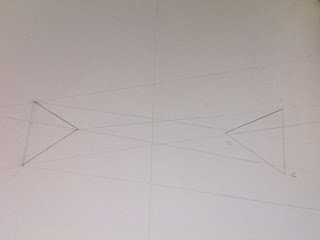experimenting with special effects on photos and putting them in a collage. Used http://www.fototrix.com/ for special effects and http://www.photovisi.com/collage/create?template=template8 for the collage.
Friday, April 23, 2010
Thursday, April 22, 2010
Saturday, April 10, 2010
Boyle's Law in chemistry lab
In this lab the students discovered that pressure and volume are inversely related; as pressure increases, volume decreases. This lab also had students working with numbers of greater magnitude than they were used to working with. The graph of volume vs pressure is a hyperbola and 1/V vs pressure turns out to be a straight line.
Thursday, April 8, 2010
M.C. Escher
Making GeoGebra tools in Geometry. Some reminded me of M. C. Escher's work. Took time to look at some of his pieces. Used http://www.photovisi.com/collage/create?template=template8 to do the collage of M. C. Escher.
Repeated designs where made by constructing a geometric shape, making it a tool, and then using the tool many times to create a design. Collage was again created using photovisi.
Sunday, March 14, 2010
Algebra 2 exploring GeoGebra (a graphing utility) Happy Pi Day!
This is an experiment with making a tool in GeoGebra. Students can do many constructions and graphing using GeoGebra. They can also make their own tool to do a special construction. With this tool, they only have to plot 2 points and the tool will automatically create an equilateral triangle. They can also turn off all the labels, but I thought you'd like to see everything that went into making this snowflake.
Tuesday, March 9, 2010
Sunday, February 28, 2010
Tuesday, February 23, 2010
Thursday, February 18, 2010
Sunday, January 31, 2010
Chemistry

Chemistry students did an experiment that identified an unknown solution. They set up a spot plate with 6 ionic solution and how they reacted with each other. When two colorless solutions are mixed and a white cloud is formed, this is a double displacement reaction. In this experiment, of the 15 reactions, only 6 formed precipitates. They tested their unknown with the same six solutions and using the way they reacted and comparing with their standards, they could identify their unknown.
Friday, December 18, 2009
Geometry
You have to see this! There is a cryptography project by Andrew Mueller on youtube that is a must see. Go to Youtube and search Learning Cryptography with Andrew. It is about a 10 minute video on what Andrew learned about cryptography, the art of writing and solving codes.
Tuesday, December 15, 2009
Physics
Physics students are wrapping up the semester with the study of angular and tangential velocities. Here students designed centripetal force apparatus. As the weight on the end of the string increased, they had to increase the speed of the stopper to maintain a constant radius. They timed 30 revolutions and measured the radius. From this information they could analyze the circular motion and compare angular velocity with linear velocity. Patrick Kelly was the king of all twirlers! :D







Thursday, December 3, 2009
Geometry
Chryptography is the topic for a mini unit in Geometry. Students are taking on the role of a secret agent and transmitting secret messages to their partner. All this fun also involves learning how to multiply matrices using a coding matrix, finding the inverse of a matrix, and decoding their secret message.
Chemistry
Students are now studying covalent bonds and an introduction to organic chemistry. Their lab this week was to build several organic compounds. When done with the required models, students asked to do more, so they were given some challenge molecules to build and many were very successful in building and identifying the benzene ring, cyclohexane, ethanol, and dimethyl ether. Very fun and exciting for the teacher!


Statistics
Statistics students are now collecting data for their final project. They will be analyzing this data and applying nearly everything they have learned this semester. They will be doing mean, median, mode, range, standard deviation, frequency distribution, many kinds of charts, random sampling, confidence intervals, error, and many more. As they progress, you will be informed of their results.
Sunday, November 22, 2009
Calculus
Saturday, November 21, 2009
Physics
Friday, November 20, 2009
Chemistry
On November 20, chemistry students are working on finding molar masses and percent composition. They have done a lab that enabled them to determine the formula for copper(II) sulfate pentahydrate and determine whether it would make a good moisture indicator in a box of electronics.
Subscribe to:
Posts (Atom)





















